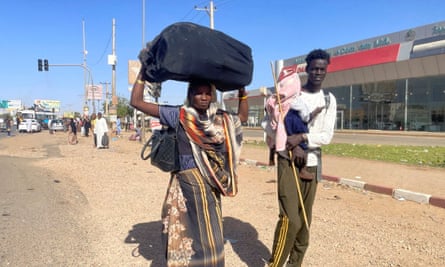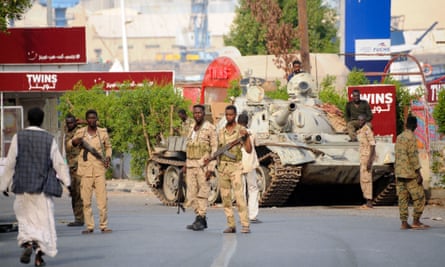New efforts to halt fighting in Sudan appeared to have failed on Friday morning, despite pledges by Sudan’s paramilitary Rapid Support Forces (RSF) to respect a 72-hour truce on humanitarian grounds.
Bombing and shelling was reported in several areas of Khartoum after the 6am ceasefire was due to commence.
Both the UN secretary general, Antonio Guterres, and the US secretary of state, Antony Blinken, had separately called for a ceasefire of “at least” three days to mark Eid al-Fitr, the end of the Ramadan fast, in the mostly Muslim country.
Other diplomats, including representatives of the African Union and several Middle East states, were in touch with both sides in the conflict on Thursday in a fresh attempt to broker a truce.
But, though some residents of Khartoum told the Guardian the night had been quieter than others since the outbreak of fighting last weekend, several witnesses reported the crackle of intense gunfire continuing on Friday morning, with columns of black smoke rising across the city.

“On the night of Eid al-Fitr, several areas of Khartoum were bombed and are still exposed to shelling and clashes between the armed forces and the RSF,” the Central Committee of Sudan Doctors said in a statement.
“We call on all citizens to exercise caution, stay home, close doors and windows and lie down. We also call on these forces to be responsible and immediately stop fighting to protect innocent lives.”
At least 350 people have been killed and thousands more injured since the fighting erupted on Saturday. The conflict has pitted army units loyal to Sudan’s military ruler, Abdel Fattah al-Burhan, against the RSF, led by Mohamed Hamdan Dagalo, known as Hemedti, who is deputy head of the ruling council. Their power struggle has derailed a shift to civilian rule and raised fears of a long, brutal civil war.
As fighting continued on Friday, Burhan appeared on television for the first time since hostilities began, to deliver an Eid address as in previous years.
Sitting behind a desk, dressed in military uniform and with two Sudanese flags in the background, he made no mention of a truce.
“For Eid this year, our country is bleeding: destruction, desolation and the sound of bullets have taken precedence over joy,” he said. “We hope that we will come out of this ordeal more united … a single army, a single people … towards a civilian power.”
The RSF said in a statement early on Friday morning that it would respect a ceasefire that “coincides with the blessed Eid al-Fitr … to open humanitarian corridors to evacuate citizens and give them the opportunity to greet their families”. There was no immediate comment from the Sudanese army.

Thousands of residents have streamed out of the capital since fighting began. On Thursday the UN said up to 20,000 people had also fled clashes in Darfur to seek safety in neighbouring Chad, with many lacking basic requirements such as food, water and shelter.
The UN’s refugee agency said the majority of those arriving were women and children, who were sheltering out in the open, some of whom had been caught up in the fighting that has raged around the country for six days.
“Due to the violence experienced by those crossing the border, psychosocial support is also among our top priorities,” the agency said, citing figures from its teams at the border.
In Nyala, a city in South Darfur, RSF forces have wrested control of many former army bases. Dozens of facilities run by international aid organisations in the region have been looted or burned, along with government offices, and many civilians killed or wounded, according to local civil society sources.
Cyrus Paye, a project coordinator for Médecins Sans Frontières, described conditions at a hospital supported by the organisation in El Fasher in North Darfur as “catastrophic”.
The hospital had seen 279 wounded patients since the fighting began on Saturday, of whom 44 have died. The majority of the casualties were civilians who were hit by stray bullets, including many children.
“There is currently heavy fighting in El Fasher,” Paye said. “It is very unsafe because of the shooting and the shelling. There are so many patients that they are being treated on the floor in the corridors because there simply aren’t enough beds to accommodate the vast number of wounded.”

 1 year ago
60
1 year ago
60










 English (US)
English (US)